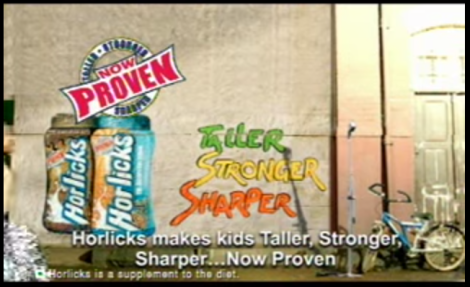Glaxosmithkline Consumer Healthcare Ltd. Vs. Abbott Healthcare Pvt. Ltd. and Ors.
Glaxosmithkline Consumer Healthcare Ltd. Vs. Abbott Healthcare Pvt. Ltd. and Ors.;
2009(40) PTC 437 (Cal)
Plaintiff, the manufacturers of Horlicks had a tagline “”Taller, stronger, sharper” for it’s health food drink powder . Defendant was using the line “sabse tallest, strongest, brightest” as a prominent feature of a commercial for a similar product called Pediasure. Plaintiff filed a suit for passing off against the Defendant.
Plaintiff’s Contentions:
The slogan being the most prominent feature of its commercial, it has come to be so exclusively associated with the plaintiffs product that any form of imitation thereof by any other person would amount to deceit and trading upon the goodwill of the plaintiff.
Defendant’s Contentions:
In the promotion of a nutritional drink, it is only natural that the manufacturer would harp on the efficacy of the product in honing physical and mental attributes.
One manufacturer of a nutritional drink cannot claim a monopoly over an idea that is generic to the product and is directly connected to the alleged efficacy of the product.
Issues:
Whether the three words have, or even the theme conveyed by the three words has, come to be so exclusively associated with the plaintiff or the plaintiffs product and the recall value thereof is so overwhelming that it leads to confusion and deceit that are the twin planks in establishing passing off; and
Whether the plaintiff can, in law, claim any exclusivity over the concept and the manner of depiction thereof.
Observations:
Laudatory epithets may be used by a manufacturer but to claim exclusivity a higher element of distinctiveness has to be demonstrated. The more descriptive the epithets, the closer the resemblance of the epithets to the efficacy of the product, the more remote will be the presumption as to the exclusivity of the combined effect of the epithets.
The manufacturer of a nutritional drink would seek to impress on the healthy values of the drink. The target users in case of these rival products are children. Every nutritional drink has to be allowed the freedom to puff and emphasise on the features of growth that will result in its user gaining height, weight and mental sharpness for these are but attributes of growth that a nutritional drink would seek to profess.
The nature of the right that is sought to be asserted would make it irrelevant as to whether a part or the entirety of the slogan is copied. That the three key words used by the first defendant in its exit line vary in form, or in one case in the use of the word, matters little if it is appreciated that it is the theme over which a manufacturer can claim exclusivity. It is, thus, irrelevant that the plaintiff and the first defendant use different grammatical variations of the words “tall” and “strong” and that “sharp” and “bright” are distinct, albeit bearing the same sense that is sought to be projected. The essence of a right that the plaintiff here canvasses is as much dependent on the resemblance of the words as on the identity of its thematic content.
If in puffing its product, the plaintiff and the first defendant hit upon features that are generic to the nature of the product, the earlier user or the bigger player or the large spender cannot claim exclusivity on the epithets. If it is the idea of taller, stronger and sharper that the plaintiff seeks to make as its very own, it may not have it. If it is a much lesser case of confusion arising out of the verisimilitude of the manner of depiction thereof of the same idea by another trader, the complaining trader may get the consolation of the defendant being required not to copy the form of expression of the idea. The exclusivity in such a case will not be in the words or the theme used by way of puff, but in how they are said or shown or depicted. The first defendant does not copy the stylised form in which the plaintiff presents its slogan in the commercial.
The Application of the Plaintiff was dismissed.


One Comment